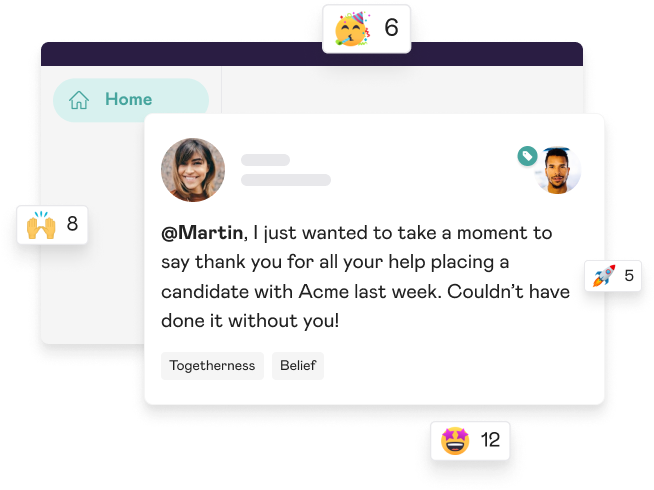When your team knows how to step up and be accountable for their own actions, your organisation will be set to flourish. It’s about putting the power to succeed in the hands of your employees and showing them you’ll support them as they grow.
What is workplace accountability?
Accountability in the workplace is when employees are able to set and manage their own goals and expectations. It is an essential component of a high-performing team and encourages employees to take responsibility for continued growth.
Why is accountability important?
Workplace accountability is an excellent attitude to foster in your employees, as people who feel as though they are in charge of their own actions are more likely to invest in their success. Rather than simply telling your team how you’d like them to behave, you can create an environment that allows them to drive and maintain their own improvement.
“When properly approached, accountability can really be the low-hanging fruit for optimising organisational performance and accelerating organisational change efforts.” – Roger Connors
Examples of workplace accountability

What does accountability look like in action? It can cover all sorts of ways that your employees interact with your organisation, their workload and each other. Here are a few examples.
Good time keeping: An employee who holds themselves accountable for their time keeping will be present for meetings and commitments as promised. They stay on top of their deliverables and manage their flexitime effectively.
Honesty and integrity: By being honest about their workloads and capability, as well as any issues they’ve recognised, employees are able to act with integrity.
Clear communication: Employees who know how to communicate what they need and who are brave about tackling difficult conversations show great accountability for the way they interact with their colleagues.
How to create accountability in the workplace
Give your employees the foundation they need to be more accountable.
1. Set clear expectations
Without a clear idea of what’s expected from them, employees will struggle to take responsibility. You can set these out in a few important ways:
- Create clear job descriptions that are realistic and accurate. Avoid role ambiguity – everyone should know who is responsible for what – and be sure to revisit the description at least once a year. Roles can shift over time, as an organisation evolves.
- Establish clear goals and objectives and agree on the ways these will be measured. It’s fine to have more general ambitions, but introducing things like SMART goals will give employees a comforting framework.
- Communicate all expectations clearly. There’s no point coming up with the things you’d like your employees to do if you’re not able to communicate it to them.
2. Lead by example
Strong leadership is essential if you want to create and foster a culture of accountability. In fact, a study by Partners in Leadership found that 84% of employees felt that the way leaders behave is the single most important factor influencing accountability in their organisations.
Leaders who demonstrate that they take responsibility for their own actions and can show how those align with the company’s culture will lay the foundation for a team that does the same. For employees to feel comfortable taking risks, they also need leaders that they trust.
3. Make accountability a core value
By taking accountability into the heart of your organisation’s ethos, you’ll show employees just how important it is to you. Ensure that you showcase accountability in a positive light. It should be about empowerment, awareness and the ability to take risks, not a way to push any sort of blame onto employees.
Making it part of your core values helps everyone work together towards the same ultimate goal – a workplace that celebrates accountability.
4. Keep track of commitments
Encourage employees to make a note of commitments and share them with their team leader, manager or peers. Without a record of their plans, it can be difficult to measure progress and stay on track.
It can be difficult for one individual to keep track of their own behaviours – we all have a bit of natural bias! Agreeing to hold each other accountable in a supportive and friendly way can make a big difference.
Do be sure to master constructive feedback before weighing in, though. The American Society of Training and Development found that if people make a commitment to a goal and share it, they’re 65% more likely to meet it. Increasing to 95% if they build in ongoing meetings.
5. Implement performance metrics
In addition to keeping track of commitments, it is a good idea to measure accountability through key performance indicators (KPIs). Clearly establish things that employees agree to be accountable for and check back during your regular reviews and check in.
Regular evaluation is an opportunity to keep things on track – just be sure to choose the right metrics for your organisation and remember that this should be part of a positive progression, which helps employees grow more motivated. It’s always important to balance accountability with employee care.
6. Use the RACI Matrix
This clear and easy to follow matrix is perfect for defining the roles of any given team member in a particular goal. Roles and responsibilities often change between projects, and this is a great way to ensure everyone is on the same page.
RACI stands for Responsible, Accountable, Consulted, and Informed and each is a role that any project stakeholder can be assigned. Create a written record using a RACI template and break down all of the tasks in a given project, and assign the role each member will play. This helps keep everyone on the same page and makes it easy for employees to know what they are accountable for.
7. Foster open communication
Clear and open communication is incredibly important when it comes to encouraging employees to take accountability. It’s essential for leaders to build trust and create an environment where it’s possible for team members to honestly voice their strengths, weaknesses and challenges.
This allows them the freedom to take charge of their own growth and career development, while also ensuring that problems aren’t left to grow and fester under the surface.
8. Reward and recognise accountability
One of the best ways to really bake accountability into your workplace is to make sure you recognise and reward employees who are embracing it.
- The motivational power of rewards and recognition is well established. In fact, 37% of employees say it’s the most important thing their manager or company can do to motivate them, according to Zippia
- Tailoring rewards to individual and team achievements is the perfect way to make sure that recognition has the most impact
- Introducing ways to show you appreciate your employee’s efforts toward embracing accountability can create a positive accountability cycle
Common challenges in promoting workplace accountability
The benefits of creating a workplace with high levels of accountability are many, but getting there isn’t always smooth sailing. The most common challenges include:
- Fear of failure – many employees may struggle with the idea that they won’t do a good job of taking responsibility for their own growth and will need reassurance and understanding.
- Business levels – when employees are overwhelmed or have too much on their plate, there’s a good chance that they won’t be able to prioritise the things that are important to their individual growth. Keep a close eye on workloads to avoid this pitfall.
- Laziness or reluctance – everyone can be a little lazy sometimes. They can also be a little resentful of new initiatives or ways of working on occasion. The best way to deal with this (as long as they are respectful in their discontent!), is with positive reinforcement and clear communication of the benefits.
Transform your culture with Mo

- Improve employee engagement scores
- Reduce employee churn
- Build a collaborative culture
Mo is a new kind of reward and recognition platform that makes it easy for busy managers to meaningfully recognise, engage and connect with their teams.
We equip managers with weekly suggestions to energise and connect with their people, help teams build habits of recognition into their day-to-day rhythms and go beyond simple rewards as a way to motivate staff.
Join companies like SHL, OVO Energy and William Hill in delivering meaningful improvement.




